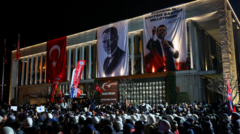Widespread demonstrations erupt in Turkey, as thousands gather night after night to protest against the arrest of Istanbul’s mayor and the government's heavy-handed response.
**Turkey Faces Protests Amid Rising Tensions and Arrests**

**Turkey Faces Protests Amid Rising Tensions and Arrests**
Grassroots movements rally against political repression following local mayor's detention.
In Turkey, the turmoil continues as citizens stage protests for a seventh consecutive night, following a series of arrests that have seen over 1,400 people taken into custody, including students, lawyers, and media personnel. The unrest was ignited last Wednesday by the controversial arrest of Ekrem Imamoglu, the Mayor of Istanbul and prominent opposition figure, accused of corruption in what many believe to be politically motivated charges.
The events have drawn criticism from both human rights organizations and international bodies like the UN, condemning the use of brute police force against demonstrators. President Recep Tayyip Erdogan responded to the chaos during a Ramadan gathering in Ankara, emphasizing the need for patience during these "sensitive days" and insisting that those wishing to disrupt the order have "nowhere to go."
Despite local government restrictions on protests, large groups, particularly students from various universities, have defied the bans and marched through Istanbul, brandishing flags and chanting anti-government slogans. The opposition party, the Republican People's Party (CHP), announced its final nightly rally outside City Hall and hinted at a larger assembly planned for Saturday to support Imamoglu and demand early elections.
Amid the ongoing unrest, Turkey's Interior Minister revealed that 1,418 protesters had been detained, labeling the gatherings as "illegal." Furthermore, media representatives, including journalists like Yasin Akgül, have been caught in the crackdown. His detention while covering the protests has spurred widespread calls for action from news organizations urging Erdogan to ensure press freedoms.
Imamoglu, alongside over 100 individuals detained during a broad investigation, remains a crucial contender against Erdogan, who has dominated Turkish politics for two decades. The upcoming elections, set to occur after Erdogan's current term ends in 2028, loom large as political tensions escalate. Erdogan's critics remain vigilant, suggesting he may attempt to alter the constitution or call for an expedited election to ensure his prolonged hold on power. The Ministry of Justice, meanwhile, refutes claims linking Erdogan’s governance to these arrests, asserting its commitment to judicial impartiality.
The events have drawn criticism from both human rights organizations and international bodies like the UN, condemning the use of brute police force against demonstrators. President Recep Tayyip Erdogan responded to the chaos during a Ramadan gathering in Ankara, emphasizing the need for patience during these "sensitive days" and insisting that those wishing to disrupt the order have "nowhere to go."
Despite local government restrictions on protests, large groups, particularly students from various universities, have defied the bans and marched through Istanbul, brandishing flags and chanting anti-government slogans. The opposition party, the Republican People's Party (CHP), announced its final nightly rally outside City Hall and hinted at a larger assembly planned for Saturday to support Imamoglu and demand early elections.
Amid the ongoing unrest, Turkey's Interior Minister revealed that 1,418 protesters had been detained, labeling the gatherings as "illegal." Furthermore, media representatives, including journalists like Yasin Akgül, have been caught in the crackdown. His detention while covering the protests has spurred widespread calls for action from news organizations urging Erdogan to ensure press freedoms.
Imamoglu, alongside over 100 individuals detained during a broad investigation, remains a crucial contender against Erdogan, who has dominated Turkish politics for two decades. The upcoming elections, set to occur after Erdogan's current term ends in 2028, loom large as political tensions escalate. Erdogan's critics remain vigilant, suggesting he may attempt to alter the constitution or call for an expedited election to ensure his prolonged hold on power. The Ministry of Justice, meanwhile, refutes claims linking Erdogan’s governance to these arrests, asserting its commitment to judicial impartiality.





















